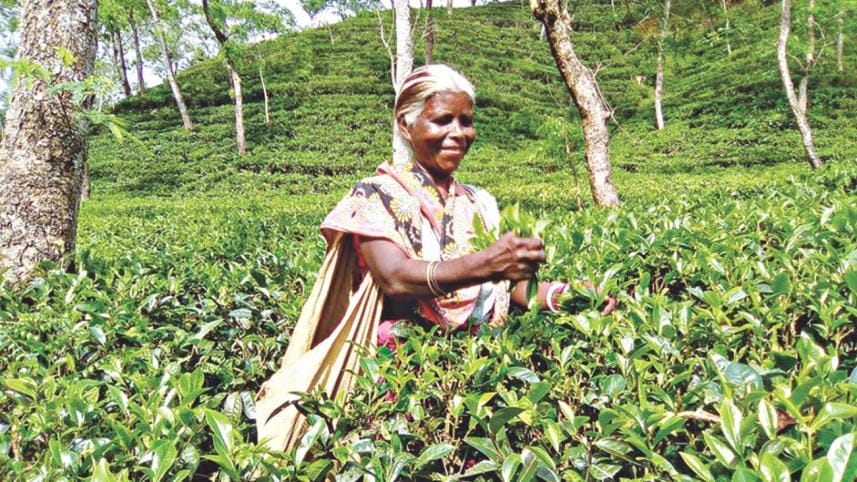Tea workers: Poorest of the poor

Almost a century ago, tea workers in Sylhet left their gardens and started a journey back to the lands of their origin -- Bihar, Odisha and Assam. It was a protest march they called “Mulluke Cholo” (Let's go back home). The protest was against the inhumane working conditions and torture at the hands of British owners.
This incident took place on May 20, 1921.
Since then, in the last 97 years, little change has come into the lives of tea workers. Today they could barely live by the wage they earn, many of them go to bed half-fed, and their families cram into small quarters lacking any sanitation facilities.
All their sufferings are related to their meagre income -- Tk 85 a day (barely equivalent to $1). It is more than three times less than the average farm worker earns daily -- Tk 300.
The tea workers in the country have long been demanding a raise to make their income on par with labourers of other sectors, but their call almost always went unheard.
Five years back, their daily wage stood at Tk 55 while they demanded Tk 120 at the time. This year, they want their income to be fixed at Tk 300.
Mohon Bauri, 43, a tea worker of Khadimnagor tea garden in Sylhet sadar upazila, said, “Our living standard has not improved because we get very low wages.”
“We start working in the tea garden from childhood but we get a meagre Tk 2,550 every month,” said Koloti Robidas, 46, of a Sreemangal garden in Moulvibazar.
He compared their incomes with that of a farm labourer and shed light on how a tea worker's family could survive with this small amount.
“We work for protecting the tea industry but the salary is too scanty to provide minimum requirements for the family,” said Gita Rani Kanu, central president of Bangladesh Tea Workers Women Forum.
“Most of the tea workers are passing days half-starved. We can hardly meet our family needs, including children's education.”
“The tea companies have been making millions of takas every year while we live an inhumane life,” she added.
Faruqee Mahmud Chowdhury, president of Shushasoner Jonno Nagorik (Shujan), Sylhet chapter, gave the same observations as the workers.
“A day labourer gets Tk 200 to Tk 400 in the agriculture sector -- none can imagine a day labourer getting less than Tk 200 a day,” he said.
“How can the garden owners pay such extremely low wages? And it is not understood how the government could approve this wage?”
Radha Moni Munda, convener of Cha Sramik Sangha, Sylhet chapter, said, “We demand Tk 300 per day along with a provision for revision of the wage every six months considering inflation.”
"We want the government to intervene and give a permanent solution," said Makhon Lal Kormokar, president of Bangladesh Tea Workers' Union.
"We demand an industry-wise fixed wage for maintaining a minimum living standard, shade and toilet facilities, and pension benefits,” he added.
He said the tenure of the last agreement on the pay structure expired in December 2016. “But the owners did not renew the deal and are still paying Tk 85 a day.”
Not only is the wage low, but the tea workers also have to sweat throughout the day.
Makhon Lal said a tea worker must collect 20kg to 23kg of tealeaves a day, working from 8:00am to 5:00pm, to be able to claim his daily wage.
He demanded a new wage agreement.
Shah Alam, vice-president of Cha Sangshad, the tea garden owners' association, said, “The draft copy of the new agreement has already been finalised. But discussion has to be held between workers and owners to fix the final wage.”
But the workers are not interested to sit for the discussion through which the problem could easily be solved, he claimed.
Contacted, Makhon Lal said the draft agreement raised the wage to Tk 94, so “we cannot just sit and settle the matter; the amount is still too small.”
In recent times, tea workers have observed partial work stoppage in many estates to press home their demand.
According to Tea Workers' Union, around 1.3 lakh registered tea workers are employed in 156 gardens across the country.
THE FAILED REVOLT
On May 20, 1921, around 30,000 tea labourers left their workplace in Sylhet region and started walking towards Chandpur Meghna Ghat. When they reached there, the then Assamese police opened fire on the protesters. Many of the workers were killed, and their bodies were thrown into the river. The rest fled.
Marking the incident, Tea Workers Day will be observed tomorrow like every year.
Sunil Biswas, president of Sylhet based Pathik Theatre, has narrated the incident in a stage play which was shown in many places including in Dhaka.
Moreover, the tea workers this year set up a simple installation named “Mulluk Bhaskorjo”, portraying the revolt, in Deondi tea garden in Chunarughat upazila of Habiganj.




 For all latest news, follow The Daily Star's Google News channel.
For all latest news, follow The Daily Star's Google News channel.
Comments